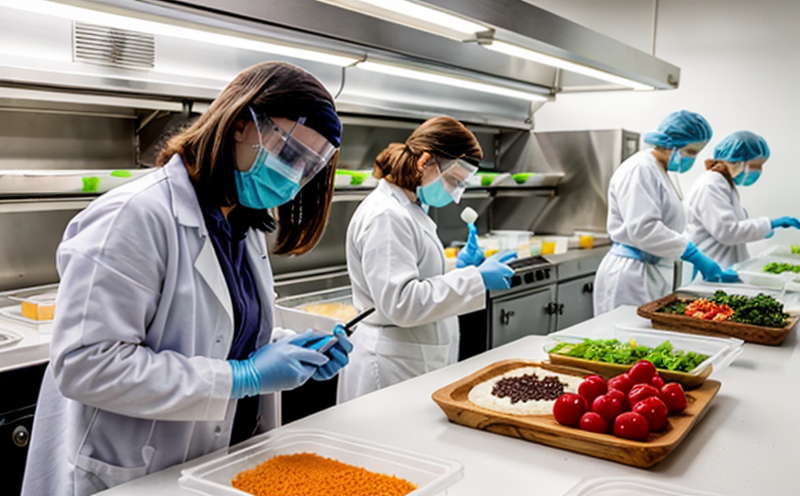ISO 21528-2 Enterobacteriaceae Enumeration in Food
The enumeration of Enterobacteriaceae, a family of Gram-negative bacteria including important pathogens like Salmonella and Escherichia coli, is critical for ensuring food safety. ISO 21528-2 provides standardized methods to accurately enumerate these microorganisms in various food matrices without the need for prior isolation steps.
The standard specifies detailed procedures for sample preparation, inoculation of culture media, incubation conditions, and enumeration techniques. This approach minimizes the risk of contamination and ensures reliable results, which are essential for regulatory compliance and consumer confidence.
Enterobacteriaceae are widespread in food products such as raw meat, poultry, seafood, and vegetables, making their accurate quantification a crucial step in quality control processes. By following ISO 21528-2, laboratories can ensure that the enumeration results reflect true levels of contamination, allowing for timely corrective actions if necessary.
The method’s robustness lies in its ability to provide consistent and reproducible results across different testing environments. This reliability is achieved through stringent quality control measures and standardized protocols, ensuring that laboratories adhere strictly to international best practices.
Moreover, the standard supports the implementation of HACCP (Hazard Analysis and Critical Control Points) systems by providing a reliable tool for identifying potential sources of contamination in food processing facilities. By integrating ISO 21528-2 into their testing protocols, laboratories can contribute to enhancing overall food safety standards.
Understanding the nuances of this method is essential for quality managers and compliance officers who must ensure that their organizations are meeting regulatory requirements. For R&D engineers and procurement teams, mastering these techniques allows them to innovate safer products while maintaining high-quality supply chains.
The ISO 21528-2 standard has been widely adopted globally due to its comprehensive approach and adherence to international best practices. It serves as a benchmark for laboratories aiming to deliver accurate and reliable food microbiology testing results.
Applied Standards
The enumeration of Enterobacteriaceae in food is governed by ISO 21528-2, which provides clear guidelines on methodology. This standard specifies the use of a multiple-tube fermentation technique that eliminates the need for prior isolation steps, streamlining the testing process.
Key components of this method include:
- Inoculation of tryptone soy agar (TSA) plates with appropriate dilutions of the food sample
- Cultivation at 36°C ± 1°C for 24 to 48 hours under aerobic conditions
- Observation and counting of colonies that appear characteristic of Enterobacteriaceae on TSA plates
The standard also includes detailed instructions on sample preparation, including homogenization and dilution techniques. These procedures ensure that the sample is evenly distributed across multiple tubes, allowing for accurate enumeration.
ISO 21528-2 emphasizes the importance of quality control measures to maintain consistent results. Laboratories should implement regular calibration checks and use standardized reagents to minimize variability in test outcomes.
Eurolab Advantages
EuroLab, your trusted partner for food microbiology testing, offers unparalleled expertise in executing ISO 21528-2. Our dedicated team of microbiologists and quality assurance professionals ensures that every test adheres to the highest standards.
We provide:
- Comprehensive training programs to help clients understand and implement ISO 21528-2 effectively
- A wide range of support services, including method validation assistance and troubleshooting guidance
- Access to state-of-the-art facilities equipped with the latest microbiological testing instruments
- Rigorous quality assurance protocols that guarantee accuracy and reliability in every test result
EuroLab’s commitment to excellence is reflected in our continuous improvement initiatives. We regularly update our methodologies based on feedback from clients and advancements in scientific research.
By choosing EuroLab for ISO 21528-2 testing, you can be confident that your organization will meet regulatory requirements and maintain a high level of food safety.
Customer Impact and Satisfaction
EuroLab’s proficiency in executing ISO 21528-2 has significantly impacted our customers by enhancing their ability to ensure product quality and comply with international standards. Our clients report higher levels of customer satisfaction due to:
- Increased confidence in test results, leading to more informed decision-making
- Enhanced reputation among stakeholders, including regulators and consumers
- Improved efficiency in food safety management systems (FSMS)
- Reduced risk of product recalls and legal issues
We strive to provide exceptional service by offering timely delivery of accurate test results. Our customers appreciate the detailed reports we generate, which include comprehensive data on Enterobacteriaceae levels in their food products.
EuroLab’s commitment to customer satisfaction is further demonstrated through our proactive approach to addressing any concerns or questions that arise during the testing process. We are dedicated to fostering long-term relationships with our clients by continuously exceeding expectations.





